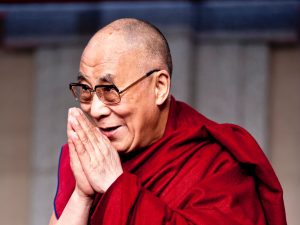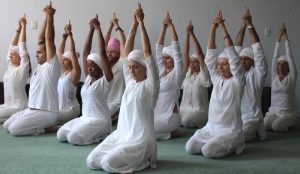I went to a restorative yoga class last Wednesday in a beautiful studio on the 3rd floor of the City College wellness center. Because of my disabilities, I could do very few of the moves, stretches, or positions, so I mostly focused on the breathing pattern, which the teacher called 3-part breathing (or dirga pranayama). I didn’t push it; I would move an arm or turn my torso as I could, and when she gave a move I couldn’t do, I just went back to breathing.

As I paid attention to my breathing and the sensations in my body, I started to relax. I stopped judging myself or the teacher or the class. I’ve been doing breathing meditations for years, but never for a two-hour session like this. About half way through, waves of happiness started moving through me. My muscles relaxed; my face lit up in a huge smile. How beautiful everything was! If I started thinking, the waves would recede, but they kept coming back, each one stronger that the one before. ‘Joy’ or ‘bliss’ would not be too strong to describe the feeling.
After the class ended, my usual day took over, but the happiness didn’t leave. I could see other people’s happiness and appreciate the beauty of objects. Everything from roadside trees to the bus that took me home, to the checkout guy at Trader Joe’s delighted me. I was having close-to-God thoughts, like about all the effort and creativity, the labor, the financial resources, materials and time that have gone into creating and maintaining things like the MUNI bus system – nearly infinite when you think about them. I felt gratitude and amazement that such things exist and that I can use them. The feeling gradually subsided but was still there until bedtime that night.
I knew that people, especially religious people have experiences like this fairly often. It sounds much like what I’ve heard that Pentecostals or yogis or Indigenous sweat lodge participants or deep meditators sometimes feel. Spiritual teachers of all faiths tell us to look within rather than to the outside world for help. Now I have experienced what we’re looking for, and I think it has changed my life. Having felt the deep reservoir of joy within, I know in my body that there is more to life than the day-to-day struggles and minutia.
I believe that each of us has this stream of joy within us. It’s a collective stream, a universal stream. It may be bricked in and covered over with layers of grief, pain, fear, or anger. It may be curtained off by thoughts, entertainment, things we want to do or have to do, or hidden by the endless assortment of multi-colored distraction capitalist society produces. Still, it’s always there and can’t be destroyed, because it comes from the life force itself.
Maybe the bliss I felt was a one-time thing, a gift from God that will never return. Just typing that thought makes me sad, but I don’t believe it. Haven’t spiritual teachers and whole religions taught people to meditate, to live plainly, or sometimes to dance ecstatically, go into trance states, or take religious drugs, to be aware of the larger, joyful reality? Maybe that’s why people like the Dalai Lama and Archbishop Desmond Tutu smile so much.


If it is true that spirituality brings happiness, we would expect spiritual people to be happier, and they are. Studies show that monks and nun, for example, tend to be happier and longer-lived than the rest of us.
Buddhist friends have since advised me not to chase joy, any more than to chase love or wealth. Pursuing joy is a form of attachment that will tie down the pursuer. Happiness is just an experience, they say. Just let it come and go as all experiences do. Still, why live in ways that actively block joy, if I don’t need to? Surely, days of joy must be a good sign; they make me nicer to be around.
I probably need to spend far less time reading e-mail. My personal inbox is an endless flow of need, grief, pain and anger. People asking for help; people trying to change terrible situations, save animals, support activists and causes. Write letters; sign petitions; donate money. All valuable; all true, all worthy, but collectively overwhelming. Social media is the same way, only with pictures and inane comments added.
Of course, the Internet has fun and interesting stuff too, but isn’t that equally distracting? I’m studying Hinduism now, and the Web feels like a giant 4-dimensional celebratioin of samsara, the world of illusion, the world of distracted pain in which we spend our entire lives, life after life. Living in samsara, I wind up going through my days in a, ‘What should I worry about next?’ mode.
So, the physical world sounds more conducive to joy than the virtual world, even if the VR is more fun. I’m pretty sure it was no accident that waves of happiness came to me in a yoga class. Focusing on the body instead of on thoughts, however distressing, pleasant, or interesting they might be, helped unlock the vault of joy. It also seems probable that sitting in a beautiful, airy studio on a sunny day with a bunch of nice people, having slept well and had a good breakfast, is more conducive to joy than being hungry and cold, sleeping on cardboard sheets in an alley.

yoga in London
Would it be best to block out the world of pain, or escape from it in a monastery or a drugged stupor? I don’t like that kind of path; it feels selfish and unenlightened, and it wouldn’t work anyway. The suffering is always there; I’m not able or willing to ignore it. I feel a need to help others when possible.
I really don’t have to figure this out for myself, do I? Thousands of spiritual teachers, starting before the Buddha and still teaching today, advise us on how to live better, more productive, happier lives. Countless books have been written, sermons given, articles posted on web sites and blogs, religious ceremonies performed, songs sung, movies made. The information is easy to find.
Suffering is always with us – that’s the Buddha’s First Noble Truth, isn’t it? – but the stream of joy is always there, too. It’s within me, and I’m absolutely certain that it is within all of us. (Of course, being “absolutely certain” doesn’t prove an idea is true, but this is my story and I’m sticking to it.) Being alive is inherently joyful; it’s the ways we live that can make us miserable.
One of the women in a study I linked above wrote of her excitement at becoming a nun at age 22, “Now I look forward with eager joy to a life of union with Love Divine.” I believe “Love Divine” is a perfectly good term for the joy within us. It is there; we just have to peel away the barriers in which we and society have wrapped it.

So important to let ourselves access and receive joy. Thanks for such a beautiful reminder!
Mindful living on all fronts help keep the Divine focus….my friend.
Powerfully written as usual, David. I, too, have found new resources and ways to balance–sometimes with joy and sometimes with peace–in yoga, an activity I never thought I’d venture into but of which I have now become a regular practitioner. The yoga teachers I love the best always remind us to bring what we learn in practice to wherever we can. Thanks for doing that.
Thank you, David. You have expressed one of the reasons I go to yoga as often as possible. I need to be reminded to live in my body–rather than run away with my thoughts. Being with others who are having similar experiences seem to be as important as the teacher reminding me to be aware of my body–not judge it, just notice it.
Indeed the inner joy is there waiting to be noticed.
Bravo, my dear friend!!